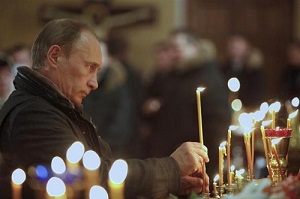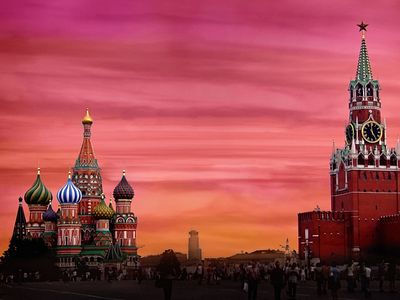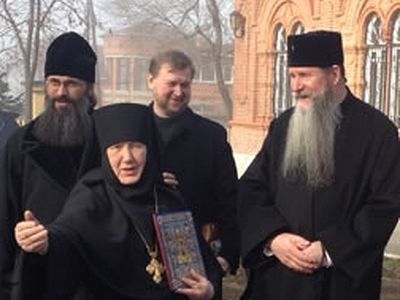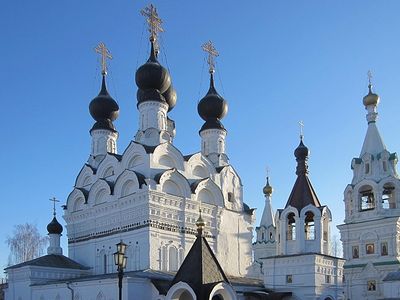Source: Russia Insider
By Frank Gushamba
November 17, 2015
Winston Churchill, in describing Russia, suggested it was a riddle wrapped in a mystery inside an enigma. As the world is increasingly forced to pay closer attention to Russia, many may look on with a mixture of curiosity, admiration and mystification, wondering what makes Russia tick.
In trying to explain Russian culture, Russians may direct the enquiring foreigner to their literature. And in this literature one will soon be met with the recurring theme of the Russian soul, an idea ultimately revealing its source to be that of Eastern Orthodox Christianity. It is essentially a theme that man does not live by bread alone. And the type of man who understands this will be a particular being in communion with the universal, a temporal being aware of eternity, a part that knows the whole. His purpose in life will be a pilgrim’s progress towards unity with God.
 Russia sees itself as the dragon slayer. St George is the patron saint of Moscow. This statue is a few meters from the Kremlin.
Russia sees itself as the dragon slayer. St George is the patron saint of Moscow. This statue is a few meters from the Kremlin.
For the modern outsider, Orthodoxy may appear a confronting relic of the past: a highly ritualistic liturgy suggesting an imprisonment to empty tradition; a disturbing refusal to embrace such modern imperatives as gender-neutrality, the men obstreperously growing their beards long with the women underfoot meekly covering their heads; no guitars, rock ‘n’ roll or a general concern to become relevant and get with the program. In a word, an insouciant disregard for the importunate demands of the world.
But what may mark the Orthodox Church as archaic and anachronistic may actually serve to reveal a church focussed on the permanent over the ephemeral. Church ritual that has essentially remained unchanged for over a millennium may speak to a steadfastness that stands solid against history’s buffeting gales rather than as representing some antediluvian oddity. Indeed such steadfastness stands in marked contrast to much of the Western Church that instead stands today like a candle in the wind.
The resurgence Christianity has experienced in Russia following the end of communism belies charges of the Church’s irrelevance. More than 26,000 churches have either been restored or built anew, which translates to opening about a thousand churches every year. Over 800 monasteries have also been opened, with no shortages of new monks and nuns. Baptisms of hundreds of people in a single day at a normal church in the city or village have not been uncommon. Reviving the concept of Symphonia, whereby the Church and State are seen to complement each other, the Orthodox Church has resumed its role in Russian tradition of occupying a prominent role in public life, sitting alongside the State.
And perhaps by understanding the central role that the Orthodox Church has played in the life of Russians throughout their history can we begin to understand the Russian mind, the Russian soul, the Russian Weltanschauung. We wrestle not against flesh and blood, and this realization may inform what motivates Russia to act the way it does on the global stage.
Russia’s main adversaries may have at their very heart, as the powers that be in ultimate control, occult secret societies whose members seem to have made a Faustian bargain in exchange for the baubles of the world. America’s endless wars seem to have been predominantly directed by members of Yale’s Skull & Bones fraternity. Practices of child abuse amongst the highest levels of the British establishment are now coming to light, suggesting, if they are ritualized, some kind of Satanic religious devotion. We contend not against flesh and blood indeed.
At the very heart of the Russian Weltanschauung, then, steering its soul, is the Russian Orthodox Church. And the worldview that the Church seeks to inculcate in its flock is a profound awareness of the spiritual nature of things, both in the personal life of the individual as well as in the world around him. Russians, both in the common man as well as in the highest levels of leadership, appear aware of the ultimately spiritual nature of the confrontation they are facing on the global scene. And it goes without saying that their main adversaries, the hidden powers that be in the West, are equally aware of the spiritual nature of the confrontation, even as their own populations, complacent in their secular humanism, remain oblivious.
So then by listening to Tchaikovsky’s Liturgy of St John Chrysostom, for example, one may begin to unwrap the mystery and come to explain the riddle. One may understand the enigma. Then looking through the glass less darkly, one may begin to understand one’s soul.




